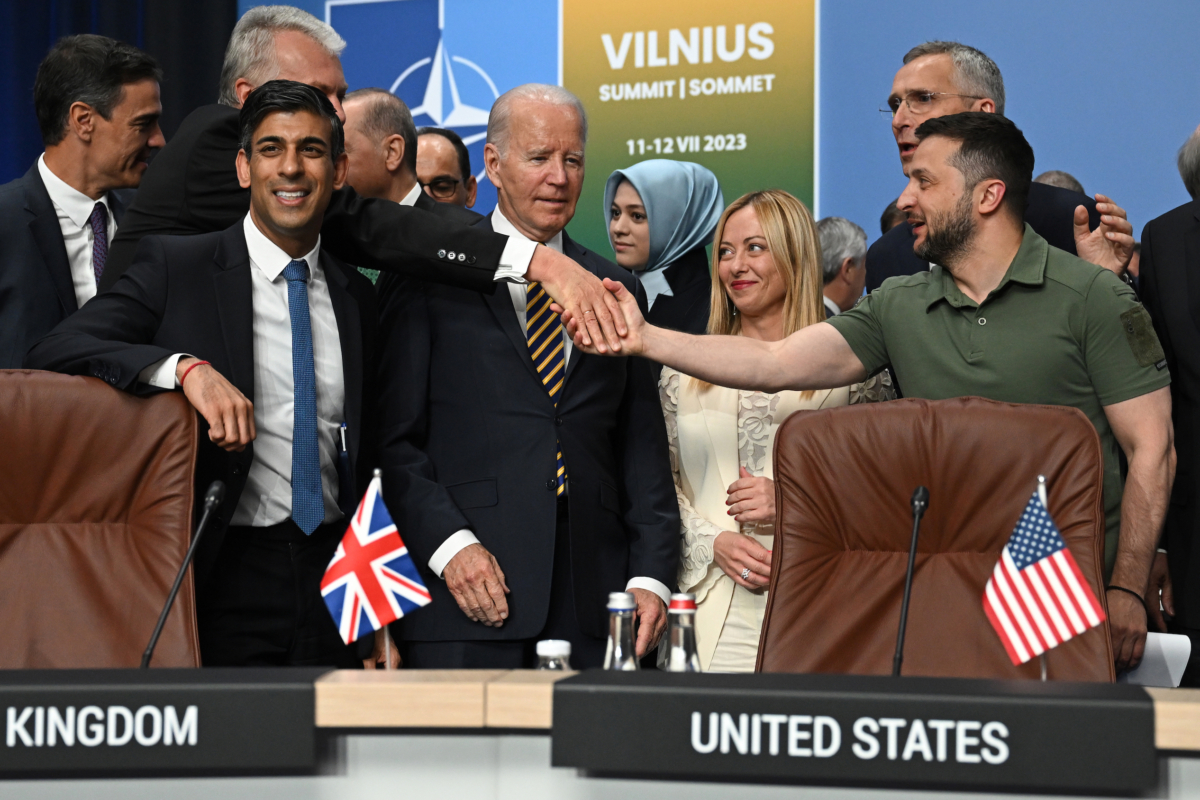



Vilnius, Lithuania:
President Joe Biden, amid discussions with the Group of Seven (G-7) leaders at the NATO summit on July 12, pledged long-term support to Ukraine as it combats Russia’s aggression.
Ukraine’s President, Volodymyr Zelenskyy, also participated in the meeting which resulted in a “Joint Declaration of Support for Ukraine.”
President Biden revealed that this consensus demonstrates enduring support for Ukraine’s defense.
In a post-meeting announcement, Biden indicated future assistance to Ukraine for building a robust defense mechanism encompassing land, air, and sea.
He emphasized the importance of securing regional stability and impeding threats.
As determined before the summit, the United States could execute “Israel-style” security commitments, incorporating various military support facets, intelligence sharing, cyber backup, and material aid for Ukraine.
The objective of this assistance is to bolster Ukraine’s defense and deter Russia’s aggression, announced National Security Advisor, Mr. Sullivan on July 9.
Following the summit, the Ukrainian delegation went home celebrating a significant security triumph for their nation.
Zelenskyy asserted during a bilateral deliberation with Biden that the events of the day amounted to an unforgettable victory for Ukraine and its people.
Acknowledging Zelenskyy’s concern regarding the slow pace of U.S assistance, Biden assured him, “The United States is doing everything we can to get you what you need as rapidly as we can.”
In response to increasing ties with NATO, Zelenskyy expressed disappointment regarding the lack of a definitive timeline for Ukraine’s acceptance into the military alliance.
His discontent was met with a range of responses among allies during the summit, with Western and Southern European nations adopting a more cautious approach compared to the proactive Eastern European nations and Baltic states.
Challenging this perception, the White House defended NATO’s stance, citing the communiqué as a powerful affirmation of forward-leaning support for Ukraine. Amanda Sloat, from the White House National Security Council, praised the communiqué’s unprecedented strength.
NATO’s pronouncement outlined the removal of Ukraine’s need to implement a Membership Action Plan and, in its place, proposed the formation of a new joint cooperative – the “NATO-Ukraine Council.”
It also introduced an “Annual National Program” that allows regular progress reviews.
Despite these advances, Zelenskyy was vocal in expressing his dissatisfaction, emphasizing Ukraine’s deserving respect and deeming it absurd that the alliance negotiated Ukraine’s stance without involving the nation.
Echoing concerns about a potential conflict with Russia, National Security Advisor Jake Sullivan reiterated Mr. Biden’s position regarding Ukraine’s membership in NATO, admitting that such admittance might ignite a conflict with Russia.
Yet, Sullivan acknowledged Ukraine’s aspirations to be part of NATO as fast as possible and indicated that while applying and advocating for acceptance is absolutely Ukraine’s right, allies must consider potential war with Russia as an “inescapable fact” of making such a decision at this time.
In view of this, Sullivan pointed out that establishing a concrete scheme for Ukraine’s potential membership was not plausible, given the fluid nature of the ongoing conflict.
Regardless of the debates surrounding Ukraine’s eventual NATO membership, G-7 allies underlined their ongoing security support.
Crucially, they committed to aiding Ukraine on both the battlefield and the economic and humanitarian fronts.
The NATO Summit thus marked a pivotal point in Ukraine’s defense journey against Russia, with Biden’s commitment to back Ukraine promising a hopeful turn of events amidst the ongoing crisis.
Read the original article here:
Epoch Times




Joe Biden is a criminal that should be locked up for treason or worse